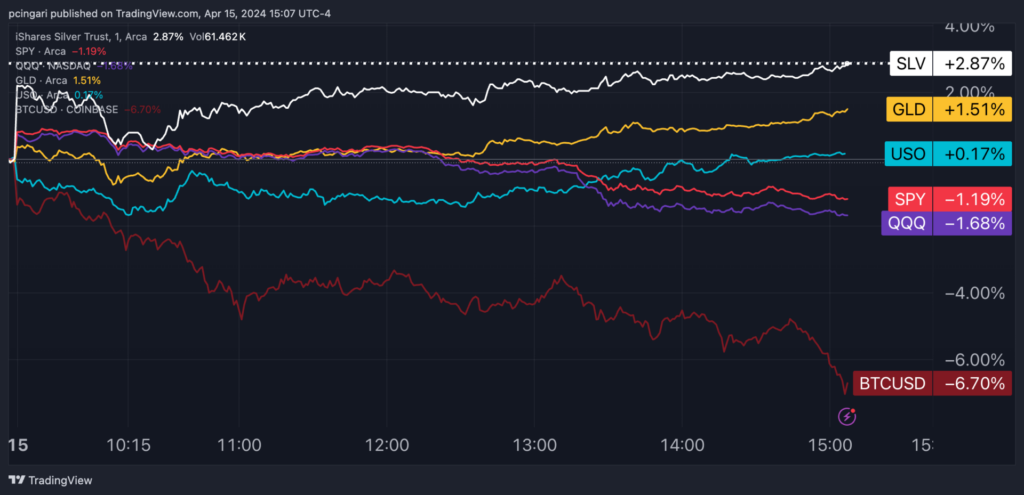Zinger Key Points
- Middle East tensions spike as Israel's war cabinet plans a "clear and forceful" response to Iran's attacks, impacting global markets.
- Financial markets react: Stocks plunge and gold prices soar amid escalating geopolitical uncertainties and safe-haven demand.
- Don't face extreme market conditions unprepared. Get the professional edge with Benzinga Pro's exclusive alerts, news advantage, and volatility tools at 60% off today.
Tensions in the Middle East have surged again, with Israel’s war cabinet convening on Monday to deliberate their nation’s response, sending shockwaves through markets.
Stocks sharply flipped to the red on headlines that Israel is mulling a retaliatory move against Iran, while gold surge sharply amid rising safe haven demand.
What happened: Channel 12 disclosed that the cabinet has resolved to respond “clearly and forcefully” to Iran, signaling that Israel “will not allow an attack of that magnitude against it to pass without a reaction.”
Defense Minister Yoav Gallant conveyed to U.S. Defense Secretary Lloyd Austin that Israel could not tolerate repeated direct attacks from Iran, yet the response will avoid triggering a full-scale regional conflict.
National Security Council spokesman John Kirby described the Iranian attack as a “spectacular and embarrassing failure” and emphasizing that “much of the world today is standing with Israel.”
The Group of 7 Leaders convened virtually on Sunday, considering new sanctions against Iran’s missile program, aiming to craft a diplomatic countermeasure that supports Israel while preventing further escalation.
Secretary of State Antony Blinken, advocating for a balanced approach, remarked, “Strength and wisdom need to be different sides of the same coin,” signaling a cautious but firm handling of the situation. Blinken also confirmed ongoing consultations with regional partners, promising continued diplomatic efforts.
Meanwhile, at the United Nations, China struck a contrasting note by defending Iran’s actions as a legitimate defense against Israeli aggression. “Iran has the right to defend itself. Israel violated international law by attacking the Iranian consulate. Iran reacted and exercised its legal right,” stated China’s representative at the UN.
Why it matters: U.S. and European allies have repeatedly warned Israel to avoid escalating a broader regional war, which could have global repercussions.
In addition to the huge cost in terms of human casualties, the economic implications of a war between Iran and Israel would be extremely devastating for the global economy.
One of the first risks would be related to increases in oil prices. Iran’s crude oil production has risen to around 3.4mb/d (3.3% of global supply).
According to Goldman Sachs, an interruption of oil flows through the Strait of Hormuz, through which currently 17% of global oil production flows, would lead oil prices to rise 20% in the first month and eventually double if the interruption persisted for several months.
Market reactions: The SPDR S&P 500 ETF Trust SPY fell 1.2% by 3:00 p.m. EDT on Monday, on track to close at the lowest level in two months.
Small caps, as tracked by the iShares Russell 2000 ETF IWM tumbled 1.8%, matching last Friday’s losses. The tech-heavy Invesco QQQ Trust QQQ sank 1.6%.
The Real Estate Select Sector SPDR Trust XLRE underperformed, down 2.1%.
Speculative pockets of the market fell even more, with cryptocurrencies reporting heavy losses. Bitcoin BTC/USD plummeted 6% to $62,400 and Ethereum ETH/USD fell 4.1% to $3,024.
On the other hand, precious metals rallied, with gold and silver drawing safe haven flows.
The SPDR Gold Trust GLD surged 1.5% on track to notch a record close. Silver, as tracked by the iShares Silver Trust SLV surged 2.9%, eyeing the highest close since February 2021.
Oil flipped erased early session’s losses, with the West Texas Intermediate (WTI) light crude surging back above $85 a barrel. The United States Oil Fund USO was 0.1% higher.
Chart: SLV, GLD, USO, SPY, QQQ and BTC – Price Action On Apr. 15, 2024

Read now: Financial Markets On Edge As Oil And Gold Prices Could Soar Amid Rising Israel-Iran Tensions
Photo: Shutterstock
Edge Rankings
Price Trend
© 2025 Benzinga.com. Benzinga does not provide investment advice. All rights reserved.
Trade confidently with insights and alerts from analyst ratings, free reports and breaking news that affects the stocks you care about.